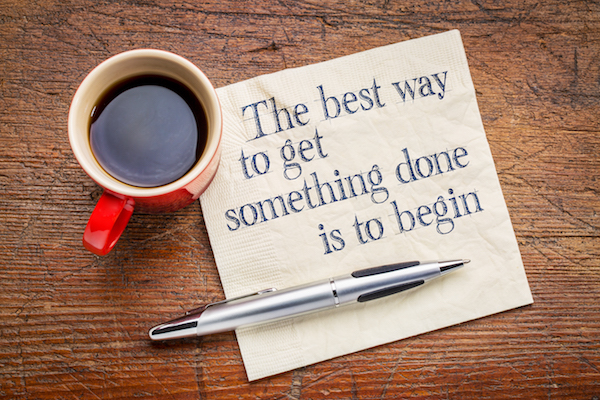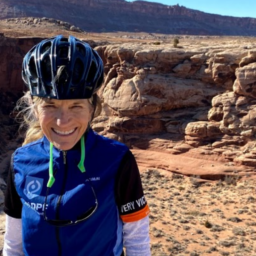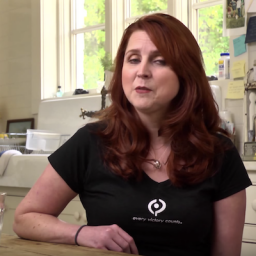At the Davis Phinney Foundation, we make it a habit to ask people what’s working and what’s not working when it comes to living well with Parkinson’s. And, over the past several months, we’ve been asking all of those who downloaded our free Exercise Essentials videos what their biggest challenge is when it comes to exercising.
While balance has been a very common answer, the winner far and away has been lack of motivation; so, we thought we’d offer some ideas on how to move past lack of motivation—when it comes to exercising or eating well or anything else that’s important to you—and take action.
The most common definition of motivation is that it’s what drives people to behave and act in a certain way.
But that definition isn’t really helpful because if we go by that, we’re buying into this idea that we have to feel ready (maybe even inspired) before we take action. If we wait to feel like doing it, we’ll probably never get off the proverbial couch.
That’s because our brains are wired to keep us safe and comfortable and far away from something that has the potential to “hurt” us—something like working out or eating vegetables or showing up at a Parkinson’s support group where you don’t know anybody.
In order to change then, we have to do things that make us nervous, uncomfortable and maybe even a little scared. Even if it feels like the very last thing we want to do.
So then the question is, how do we get started when there’s no motivation in sight?
We simply must decide.
Not so much in our heads, but with our bodies.
You see, if we think about deciding, and wonder what we should decide, we’ll get stuck in analysis paralysis mode. We’ll remind ourselves of all of the reasons a particular action such as riding a bike or walking into a gym or signing up for a boxing class is a bad idea. Our brains will get busy looking for ways to protect us and to talk us out of something that will make us uncomfortable.
However, if we just go do it, there’s no time for that. There’s no time for our brains to stop us.
Change, as it turns out, comes down to very fast decisions. It comes down to not hesitating, not waiting for the confidence or courage to be there and not waiting for the feel-good feelings to propel you forward. It comes down to DOING it even when you don’t feel like it.
“You are one decision away from feeling better in your body, from feeling more supported on your journey, from feeling empowered to live the life you want to live.“
Because the truth is, you are one decision away from feeling better in your body, from feeling more supported on your journey, from feeling empowered to live the life you want to live.
If we go back to the example of the Exercise Essentials video, or any type of exercise you can do safely that will help you live better with Parkinson’s, it’s a matter of closing the gap between the knowledge you have about the benefits of exercising and the action of actually exercising so that it happens with no delay.
One of the ways that many people bridge this gap is by creating a trigger. For some, the trigger is their alarm. The minute they hear their alarm go off in the morning, they get out of bed without thinking and walk downstairs to their gym or get on their stationary bike or whatever it is they do.
For some, especially those who have a more difficult time moving in the morning, their trigger is the end of the 12 o’clock news or an alarm they set at 3 pm or after their last meeting at work. Or, when their friend knocks on their door to pick up their work out buddy. The trigger is what gets them into action. They don’t spend time thinking about whether they want to do it or not, they simply experience the trigger and take action. The trigger serves as the mechanism that outsmarts your brain, the one trying to keep you safe. In this way, the trigger is your signal to move, not your brain.
The hope now is that you’ll stop waiting for motivation to strike, and instead, the moment your inner wisdom bubbles up or you hear that trigger, you act. No hesitation, no analysis, no thinking at all. Just acting on behalf of how you truly want to feel.
Please know, we don’t expect this to be easy. It’s not. And please don’t beat yourself up if getting in the habit of acting on behalf of your desires doesn’t happen every time. And no matter what, please don’t give up on yourself. Change takes time, but you do have the power within you already to build a habit that will help you live well and better with Parkinson’s.
Would you like to connect with others who can help you live better with Parkinson’s?
Our Davis Phinney Foundation Ambassadors have a wealth of experience when it comes to taking action to live well with Parkinson’s. They’re also great at helping people stay on track, stay accountable to their goals and find the resources they need in their local communities to connect with others traveling a similar path.
Learn more about our Ambassadors and connect with one (or more) here.





